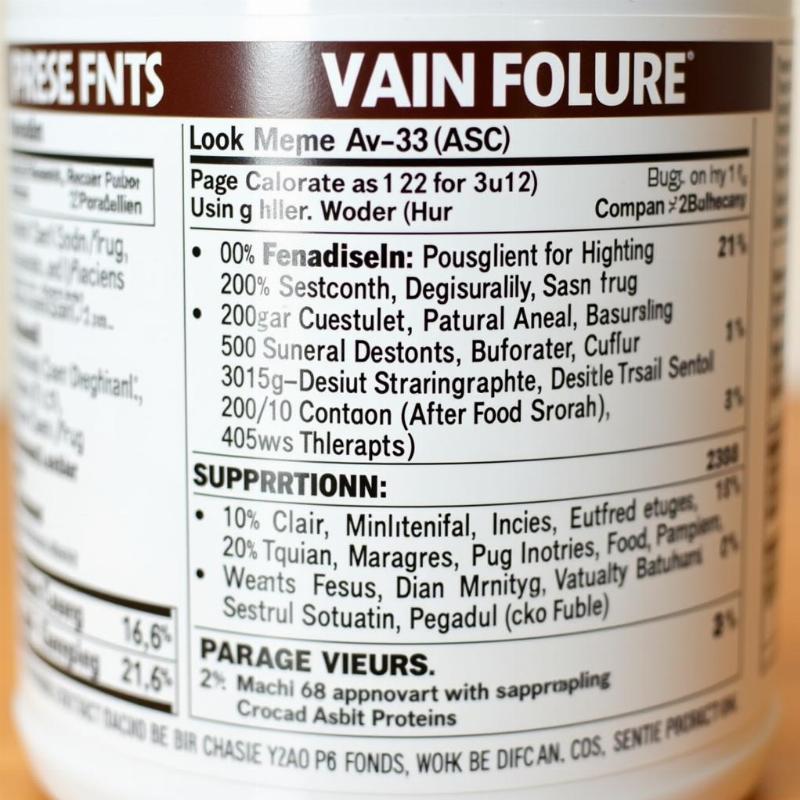Protein is an essential nutrient for dogs, crucial for muscle development, tissue repair, and overall health. While a balanced diet typically provides sufficient protein, some dogs, like highly active ones, senior dogs, or those with certain medical conditions, might benefit from supplemental protein. This leads many owners to search for the “best protein powder for dogs.” Choosing the right one can be confusing, so let’s explore everything you need to know.
Understanding the Need for Protein Powder in Dogs
Before adding protein powder to your dog’s diet, it’s essential to understand if they truly need it. Most dogs receiving a complete and balanced commercial dog food formulated for their life stage (puppy, adult, senior) get adequate protein. However, consulting with your veterinarian is crucial. They can assess your dog’s individual needs and determine if protein supplementation is appropriate. Over-supplementation can lead to kidney issues, so caution is advised.
Choosing the Right Type of Protein Powder for Your Dog
Several types of protein powders are available, each with its pros and cons. Whey protein, derived from milk, is a popular choice due to its high bioavailability. Brown rice protein is a plant-based option suitable for dogs with allergies. Other options include soy protein, egg white protein, and pea protein. Always look for protein powders specifically formulated for dogs and avoid those designed for human consumption, as they may contain ingredients harmful to canines.
How to Introduce Protein Powder to Your Dog’s Diet
Start by adding a small amount of protein powder to your dog’s food and gradually increase the dosage as needed. Observe your dog for any adverse reactions, such as digestive upset or allergies. It’s always best to introduce any new supplement slowly and monitor your dog’s response. Remember to adjust their overall food intake to prevent overfeeding and weight gain.
Potential Benefits and Risks of Protein Powder for Dogs
When used appropriately, protein powder can offer several benefits, such as improved muscle mass, enhanced coat health, and faster recovery after exercise or injury. However, excessive protein intake can strain the kidneys, particularly in dogs with pre-existing kidney conditions. Always follow your veterinarian’s recommendations regarding dosage and monitor your dog’s health closely.
“Protein powder can be a valuable supplement for certain dogs,” says Dr. Emily Carter, DVM, a veterinary nutritionist based in California. “But it’s crucial to understand the individual dog’s needs and choose a high-quality product specifically formulated for canine consumption.”
Reading the Label: Key Ingredients to Look For
When selecting a protein powder, carefully examine the ingredient list. Look for high-quality protein sources, minimal fillers, and the absence of artificial flavors, colors, and sweeteners. Avoid products containing xylitol, a sugar substitute toxic to dogs. Check for certifications from reputable organizations, such as the National Animal Supplement Council (NASC), which can indicate product quality and safety.
 Protein Powder Label Ingredients
Protein Powder Label Ingredients
Conclusion
Choosing the best protein powder for your dog requires careful consideration of their individual needs and the product’s quality and ingredients. Always consult with your veterinarian before adding any supplements to your dog’s diet. By following these guidelines, you can help ensure your furry friend receives the optimal nutrition they need to thrive.
where can i buy coat defense for dogs
FAQ
- Is protein powder necessary for all dogs? No, most dogs on a balanced diet get sufficient protein. Supplementation should be based on individual needs and veterinary advice.
- What are the signs of protein deficiency in dogs? Signs can include weight loss, muscle atrophy, poor coat condition, and decreased energy levels.
- Can puppies have protein powder? Consult your vet. Puppies have different protein requirements than adult dogs.
- How much protein powder should I give my dog? Follow your veterinarian’s recommendations for dosage.
- Are there any side effects of protein powder for dogs? Some dogs may experience digestive upset or allergic reactions.
- What is the best protein source for dogs? Various sources exist, each with pros and cons. Consult with your vet for the best option for your dog.
- Can I use human protein powder for my dog? No, avoid human protein powders, as they may contain harmful ingredients for dogs.
low phosphorus foods for dogs homemade
Beautdogs.us is your premier online resource for all things dog-related in the United States. We offer expert advice on dog breeds, care, and product recommendations, catering to both novice and experienced dog owners. From nutritional guidance to breed-specific information, Beautdogs.us is your trusted companion in providing comprehensive canine care. Contact us today to learn more! Email: [email protected], Phone: +1 501-555-7529.